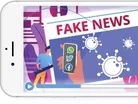Can games combat vaccine misinformation?

How is misinformation affecting healthcare?
Following hot on the heels of the global spread of COVID-19, misinformation and conspiracy theories about its origins have spread, such as 5G cellular networks being the cause, as well as around the motivations behind preventative measures like vaccinations, face masks and social distancing (a political ploy, no less).
Why is it important to tackle it?
These misplaced beliefs have resulted in substantive, negative real-world outcomes. A recent study found that when participants viewed articles rife with vaccine misinformation, their willingness to get vaccinated dropped by 6.2 percentage points in the United Kingdom, and 6.4 percentage points in the United States, even though they had previously indicated they would definitely accept a vaccine.
Adhering to the World Health Organization (WHO) approved preventative measures is the only way to dramatically reduce the pandemic’s impact, so cutting through the confusion to ensure that people across the globe have access to the facts, regardless of their varying opinions, languages and cultural contexts, is crucial.
How can games help?
People learn better when they are engaged with the content, and playing a game provides an immersive and rich experience. Serious games are designed to educate and nudge a change in behaviour and not just entertain. A game is a set of rules, has a goal and offers opportunities for feedback.
Critically, games are also played voluntarily, and require skill rather than luck. By giving people agency, and a safe space to learn, messages are subtly imparted, and resonate deeply. Gamification then refers to the application of gameplay elements in non-gaming settings. You harness the power of voluntary engagement, a balance of intrinsic and extrinsic motivation - skill and fun - to motivate people.
Has gamification been used in healthcare before?
It isn’t a new phenomenon. At the end of 2012, there were more than 30,000 digital health apps available in app stores, nearly 250 million downloads were recorded, and revenue earned amounted to more than US$11 billion. This demonstrates the depth of public interest in using digital applications for managing their own health.
These apps are primarily designed so people can monitor things like their own sleep patterns, nutrition, and weight. What makes them successful is their use of innovative gamification techniques like mastery levels, points, badges, and leaderboards to encourage users to make small improvements to their own health.
Gamified health apps not only improve people’s knowledge, but have the potential to drive changes in attitude and behaviour towards health, encouraging people to take actions in the real world that improve health outcomes. This concept can be applied in a COVID-19 reality in order to encourage people to maintain a healthy lifestyle, ensuring they are better placed to fight off infection in the worst case.
How can games be used specifically to address COVID-19 misinformation?
A game could be developed to demonstrate and visualise the impact of the spread of COVID-19, and the power of vaccines and other preventative measures like social distancing and improved personal health. Once game developers understand the requisite learning outcomes, a game can be designed that challenges players to keep their neighbours and themselves safe from the virus.
Players can try and fail in a safe space, receiving feedback on whether they’ve made the right choices. After trying and failing and trying again, players will come to understand the underlying facts about why preventative measures must be followed.
A great example would be to take a cue from the wildly popular online game Among Us, which involves a space crew completing mini tasks to repair the ship, while an alien imposter tries to sabotage their work and kill off the crew. The crew doesn’t know which of them is the imposter, so lying and misdirection are essential for an imposter player to succeed.
If the imposter can successfully shift the blame to someone else, or create enough confusion that no one gets enough votes to be ejected, the game continues. A game created with a similar premise - working together on the common goal of combating COVID-19 while navigating lies and misinformation - could help players sharpen their critical thinking skills and boost understanding and acceptance of public health guidance.
- Gates Foundation & South Korea to embolden healthcare sectorTelehealth & COVID-19
- Polio in 2022: the virus is back in the post-COVID-19 eraTelehealth & COVID-19
- Digitalisation and supply chains: the NHS post-COVID-19Hospitals
- Australian healthcare workers COVID-19 appreciation paymentHospitals



